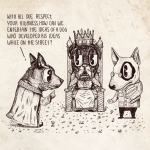In the aforementioned book, Magee enumerates the following parallels between Hegel and Hermeticism: 1. Hegel holds that God’s being involves “creation,” the subject matter of his Philosophy of Nature. Nature is a moment of God’s being. 2. Hegel holds that God is in some sense “completed” or actualized through the intellectual activity of mankind: “Philosophy” is the final stage in the actualization of Absolute Spirit. Hegel holds the “circular” conception of God and of the cosmos I referred to earlier,... Read more




















